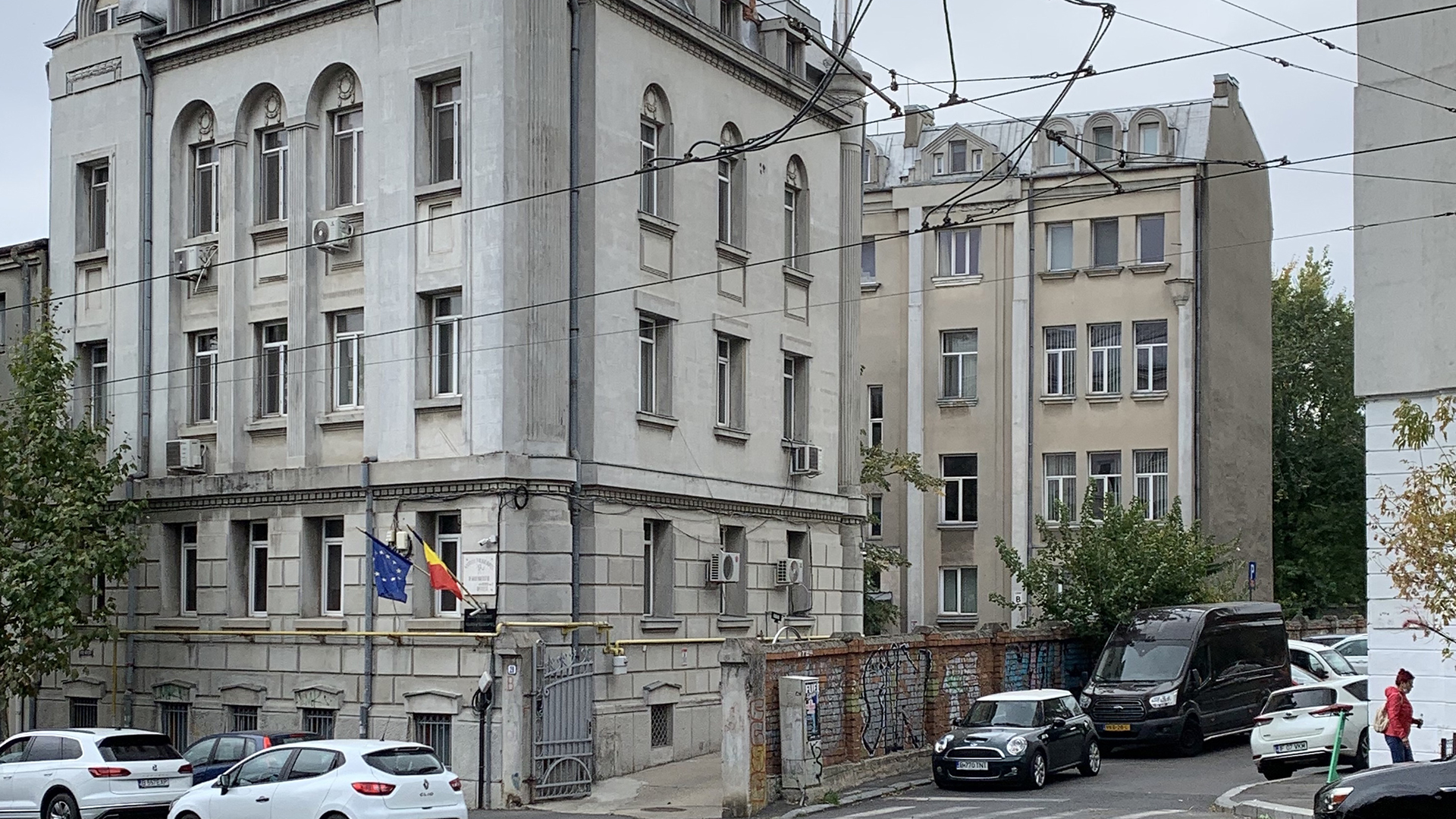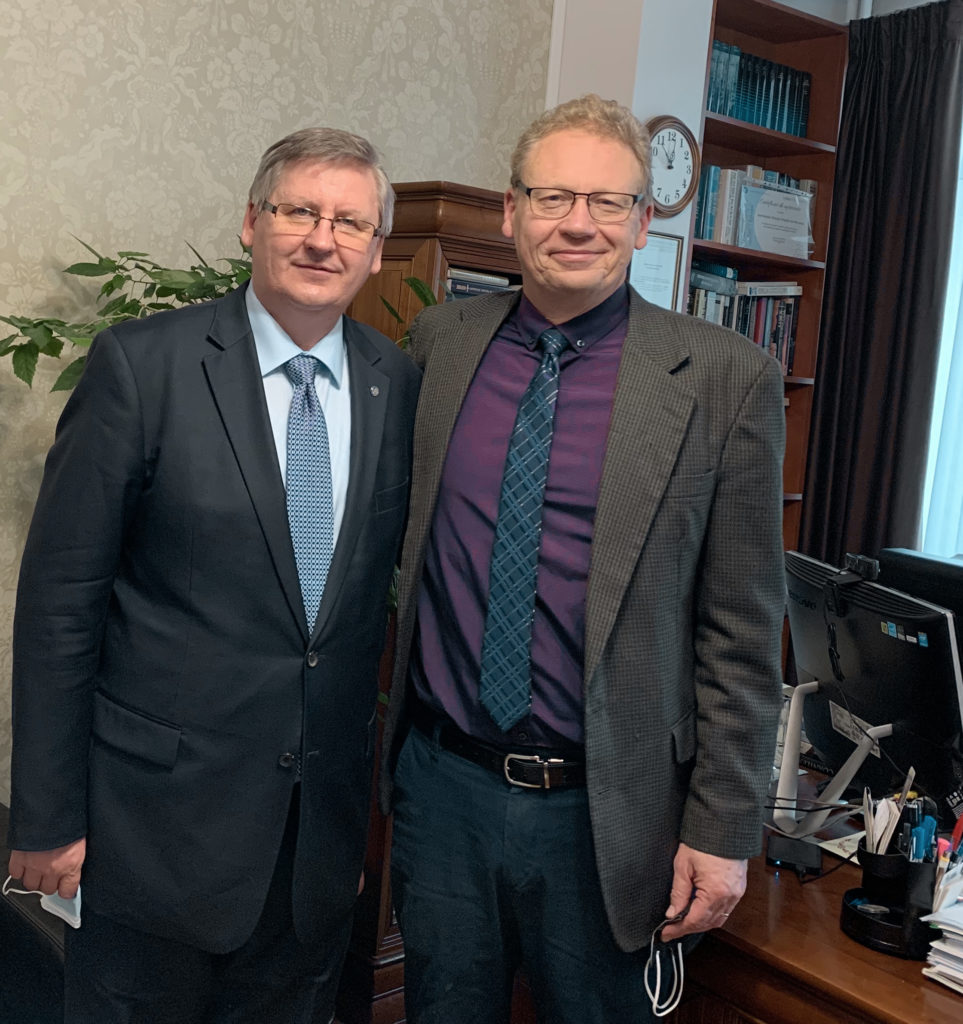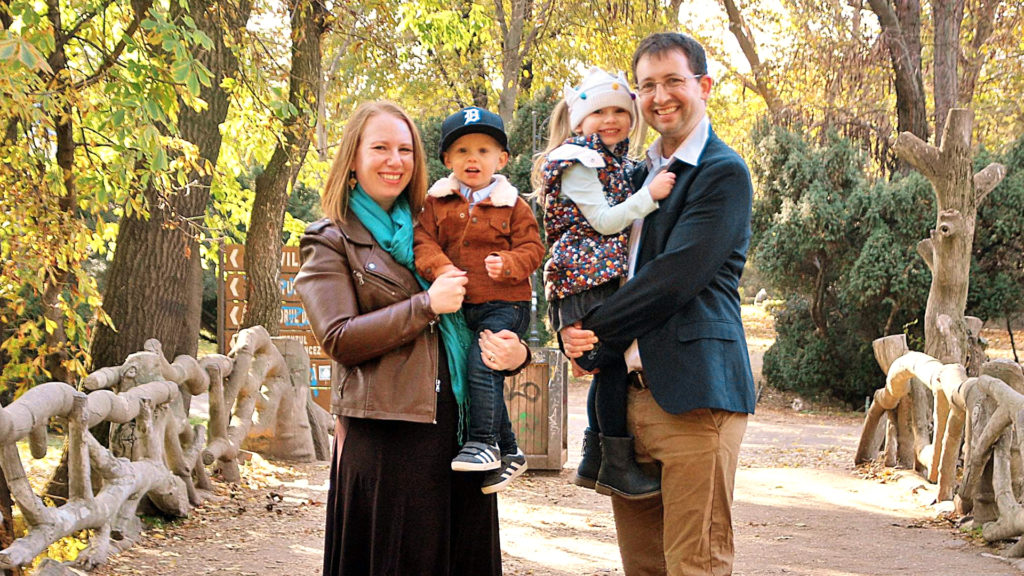On a cobblestoned side street, behind an ornate wrought-iron gate in the center of Romania’s capital, Bucharest, sits the fruit of 100 years of Baptist cooperation.
Strada Berzei 29 is just a small plot of land tucked behind the communist-built apartment blocks that tower over it. On this land sits the Bucharest Baptist Theological Institute (ITB), the cornerstone of Baptist work in Romania. It was purchased 100 years ago with Southern Baptist money, some of which was raised by the Woman’s Missionary Union (WMU) selling eggs collected on Sunday mornings.

Strada Berzei 29, the location of ITB for 100 years.
That small fundraiser resulted in hundreds of men and women trained in how to understand the Bible, teach and preach, start churches and disciple believers, and how to evangelize, send missionaries, and impact their communities with the gospel. Today hundreds of churches have been planted around the world through alumni of ITB.
Current seminary president Daniel Maris expressed how grateful Romanian Baptists are for the long-standing support of Southern Baptists.
“From the beginning, Southern Baptists came alongside our Romanian Baptist leaders to make a priority of training our pastors and church leaders. We thank you and are grateful,” he said.
A short history
In 1920 Europe was tattered and broken from WWI. Baptist leaders from Europe and America met in London to formulate a plan to support Baptist work across the continent. The Foreign Mission Board (FMB, now the International Mission Board, IMB) agreed to partner with Romanian Baptists. During this meeting E. Y. Mullins, president of The Southern Baptist Theological Seminary (SBTS) in Louisville, Kentucky, met leaders from Romania. He encouraged them to set up a training school for preachers and church workers.
Romanian leaders took this advice to heart and began a small seminary outside Bucharest the following year. Providentially, Ioan Socaciu, a Romanian who had studied at SBTS returned home just in time to become the first president. Everett Gill, the FMB’s representative for Europe, came to assess the seminary and realized the need for a permanent location for the school. He bought the property at Strada Berzei 29 with Southern Baptist funds, including money raised by the WMU. The seminary asked for a full-time worker to come and labor alongside them. In 1923 the first FMB missionaries arrived in Romania.
Interestingly, the ties that bind are not just philosophy and finance, but actual DNA. One of the first missionaries in the early years was a young woman named Earl Hester. She became the director of the James Memorial Training School for Baptist women, also built with money raised by WMU. She married a Romanian colleague, and Maris is their grandnephew. He remembers writing and receiving letters from them when he was a youth.

Daniel Maris (left) met with IMB missionary and former ITB professor Preston Pearce at the seminary’s centennial celebration in October 2021. Pearce taught at ITB from 1995–2001.
“They were a great encouragement to me from the very beginning to be involved in ministry and mission,” said Maris. “It’s a great legacy.”
FMB had to pull missionaries out of Romania during WWII and the years of Soviet rule, but they continued to visit until they could move back in 1989 when Communism fell. Fortunately, the seminary was still standing. During the Soviet era, property all around the school was confiscated, leveled and repurposed for the regime. The towering apartment blocs that keep the seminary shaded from the sun were built where small homes and businesses used to be. But because the seminary was owned by Americans, the Communists couldn’t touch it. God’s providence kept Strada Berzei 29 safe.
The school was even allowed to stay open but with only a few students. After the revolution, the student body quickly increased from a handful to over 100 in residential and distance programs.
Professors with PhDs were sent by IMB to walk alongside Romanian leaders, helping them develop their own faculty and theology. They also helped the seminary get full accreditation, both as a seminary and as a Baptist college within the University of Bucharest. This latter accomplishment illustrates the truly phenomenal changes in the reputation of Baptists in post-Communist Romania.
The Baptist college offers three degrees as a double major alongside Baptist theology: social work, foreign languages and Romanian literature.
“The idea was to train young people to spread out all over Romania and work as social workers and teachers, going where the evangelical presence was lacking and going where no one wanted to go,” Maris said. “In the past 30 years, that vision has been accomplished.”
Since its inception, 1,000 people have graduated from the university’s Baptist college and have started careers in social work and teaching. As they’ve moved throughout the country, they’ve helped their communities and planted churches.
Maris credited IMB’s church-planting focus, initiated in the 1990s, in helping Romanian leaders catch a vision for taking the gospel into unchurched areas, like South Romania and in Roma communities.
Some of the early post-communist graduates were from Moldova, and they went back home and started a seminary for training church leaders and missionaries. They have seen 2,000 graduates in the past 30 years and have opened three other training centers in the former Soviet Union. Their graduates are reaching into places where Americans can’t go.
Two families who graduated from the Baptist college at the university moved to Peru and began a pioneer Bible translation project with a native tribe. They come home regularly and share about their work. Many young people have expressed interest in going to work with these families in short-term missions once COVID restrictions lift.
Another graduate is a member of Romanian Parliament and has held Bible studies in the Palace of Parliament.
When Romania entered the European Union in 2008, its influence spread all over Europe.
“Our diaspora is one of the largest in world. Young families moved to countries like France, Italy, Germany and Great Britain, bringing the gospel and establishing churches,” Maris said.
In addition to ITB’s campus, its online programs, and its university faculty, they also partner with organizations in Great Britain to train non-seminary students in youth ministry and cross- cultural missions.
Partnership today
As ITB changes and adapts with each new season, they continue to faithfully teach and preach the gospel. Cameron Armstrong, a current IMB missionary to Romania, who has been teaching at ITB since 2015, tells a story that illustrates Southern Baptist partnership with ITB and why it makes a difference.

IMB missionaries Cameron and Jessica Armstrong have both taught classes at ITB. They have been in Romania since 2015. They are pictured with their children, Sara and Noah.
“Edy was my student at the Baptist Institute. The course I taught Edy was Biblical Evangelism. From the first day, Edy impressed me with how well he understood the gospel. But what impressed me more was when we went out as a class to a local park to speak with people about the Lord Jesus. As usual, we went out that day in groups of two and three people. After an hour or so, we gathered together to pray and close the class meeting. Then something happened that I did not expect.
Edy asked me, ‘Professor, is it ok if I stay a bit longer to talk with more people?’
‘Uh, well, yes. But you should know that class is over for today.’
Edy responded, ‘I understand. I just don’t want to stop.’”
Joining the partnership
WMU is still raising money for Southern Baptists mission work, but the effort has grown from the egg-selling days. One hundred percent of the annual Lottie Moon Christmas Offering® goes to support the life and work of the IMB’s 3,600+ overseas personnel — 723 of whom are in Europe. The money used to help Romanian Baptists 100 years ago is still bearing fruit today.
What legacy will your gift today leave in Europe 100 years from now?
You can contribute to work that continues to fuel Southern Baptist work in Romania and around Europe. Give to the Lottie Moon Christmas Offering, where 100% of donations go to support IMB missionaries. Or you can give to our Gospel Training fund to support Baptist seminaries and training initiatives across Europe.

